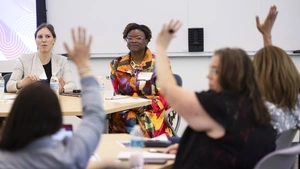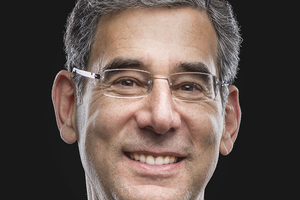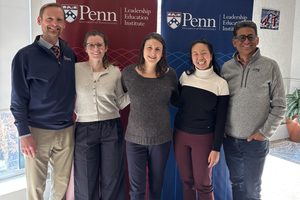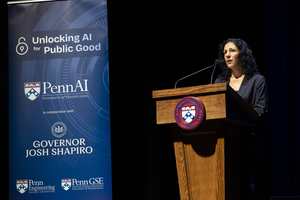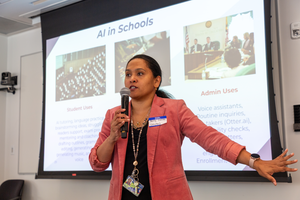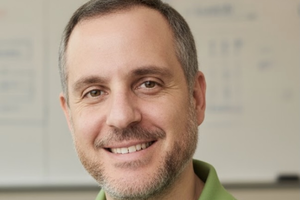Penn GSE’s Catalyst Innovation Summit 2025 returned for its second annual installment on June 6, bringing together over 170 attendees—including edtech founders, investors, researchers, and educators—for an energizing, high-impact day. Catalyst is Penn GSE’s center for global innovation and is home to Catapult, a virtual accelerator. This year’s Summit was designed around Catapult’s four “lanes of acceleration”—product, market, finance, and leadership—and brought together visionary ideas, evidence-based research, and candid conversations.
In a welcoming keynote, Matt Tower of Whiteboard Advisors offered a data-rich landscape scan of the edtech market, including the effects of post-COVID funding slowdowns, shifts toward business-to-business models, and the increasing centrality of AI in shaping investor and school district decision-making. “Education is fundamentally political,” Tower noted, “and edtech is downstream from that”—setting the tone for the day’s critical yet solution-oriented approach.
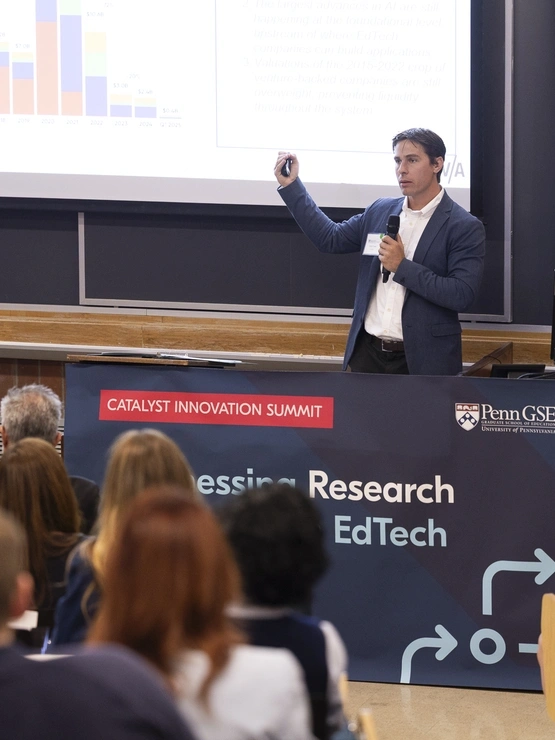
The summit’s structure encouraged participants to move between breakout sessions tailored to different growth needs, tackling essential topics like grant funding, early-stage investment, relationship-based sales, legal survival for founders, and AI-informed product design.
During the “finance” spotlight, early-stage investors like Monique Malcolm-Hay, Antonia Dean, and Sushma Rajagopalan provided behind-the-scenes insights into what makes edtech ventures stand out to investors—emphasizing the importance of values-driven storytelling, clarity of mission, and impact-driven models.
“The panel on early-stage investing really hit home for me,” said Ruchi Arora, GED’25, a Penn GSE student in the Learning Sciences and Technologies program. “It reminded me how essential it is—not just to have a great idea—but to present it with purpose, precision, and connection.”
A session, titled “Leveraging Research to Amplify Impact,” featured voices from across academia and industry, including Penn Learning Network’s Executive Director Lara Paparo, Ed Metz (who ran the Small Business Innovation Research program at the US Department of Education), and Chief Experience Officer of PeopleBench Katie Rediger. They emphasized the importance of connecting researchers to developers and entrepreneurs early on to ensure scalable, evidence-based solutions.
Dean Katharine Strunk gave a keynote that reinforced Penn GSE’s vision of research with consequence. “Innovation is not about novelty,” she stated. “It’s about solving persistent problems for real communities. Who are we innovating for? And how can they inform us to help them?”
Lunch doubled as a networking opportunity organized by sector—PreK–12, workforce, and higher ed—enabling deeper thematic conversations between guests from around the country. It was clear that beyond pitch decks and funding, the Summit was about building a sustainable ecosystem.
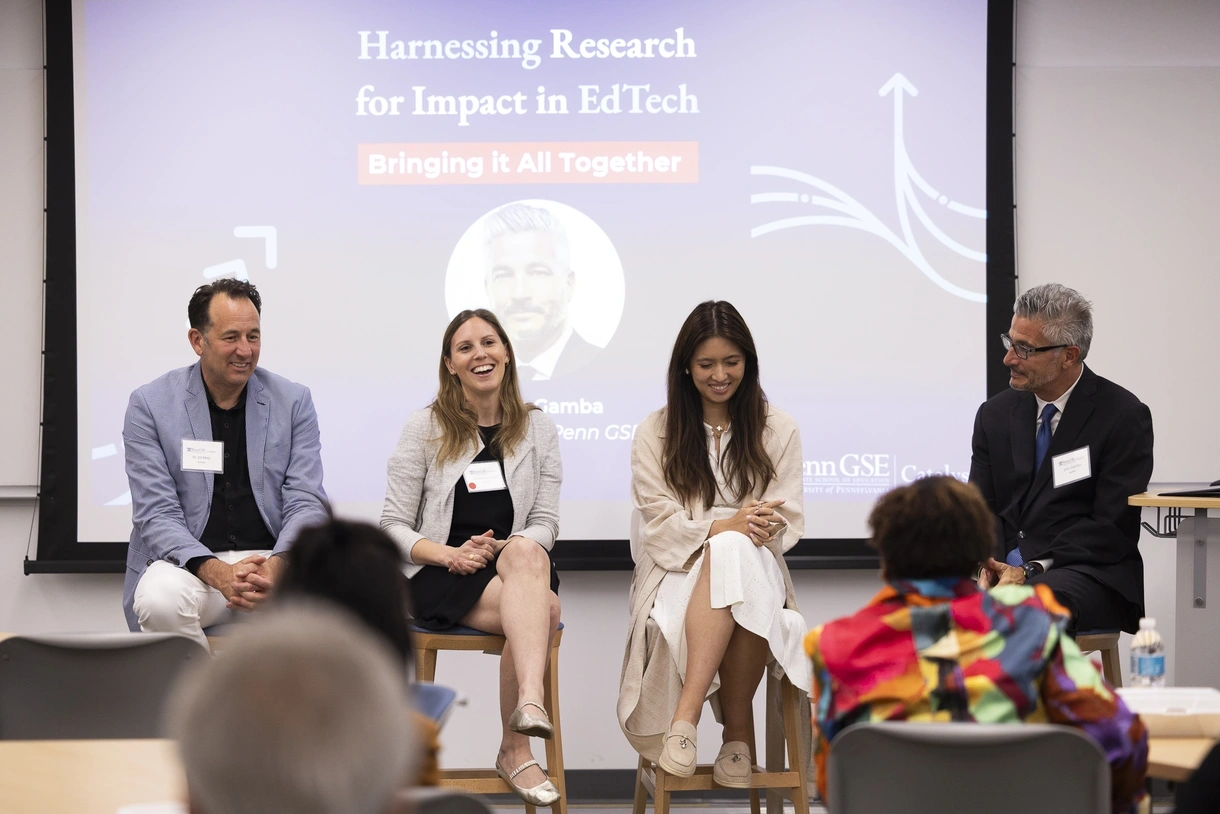
The day was overflowing with founders sharing their experiences. Erich Reiter of SAY IT Labs, the 2024 winner of the Milken-Penn GSE Education Business Plan Competition, gave a spotlight talk. A follow-up session on smart design, AI, and data-informed development by Cognativ’s founders, Murali Vishnuvajhala and Amit Basu, emphasized the discipline and clarity needed to create tech that truly supports learning. Executive Vice President & General Manager at Wiley Talent, Todd Zipper, C’98, spoke on “10 Lessons from the Edtech Trenches,” which struck a chord with many, especially his reflections on agency, humility, and hiring with intention.
“I came to understand how research, innovation, and investment are converging to reshape learning—from K–12 to workforce,” said attendee Samuel McDonald, GED’25. “What struck me most was the genuine spirit of collaboration and generosity in the room—people weren’t just pitching ideas, they were openly sharing hard-won lessons.”
The Catalyst Innovation Summit is also part of a year-long arc that includes the Milken-Penn GSE Education Business Plan Competition. Semi-finalists were featured in a product spotlight, and this fall’s final pitch event in New York will continue the momentum sparked in Philadelphia.
Katrina Struloeff, director of growth and impact at Catalyst, explained the Summit’s origins as an in-person complement to the Catapult program. “We’re still shaping what this Summit will become,” she said. “But our goal is to create a space that’s interactive, engaging, and increasingly accessible to students and early-career innovators.”
“Our annual Innovation Summit serves as an oasis,” said John Gamba, C’92, entrepreneur-in-residence and director of innovative programs at Catalyst @ Penn GSE, “for education leaders, entrepreneurs, and researchers to convene, share insights, and plot powerful paths forward to advance impact and equity in worldwide education. The stakes are incredibly high.”
For those who attended, the Catalyst Innovation Summit 2025 was more than a conference—it was a living example of what happens when research, innovation, and shared purpose collect.
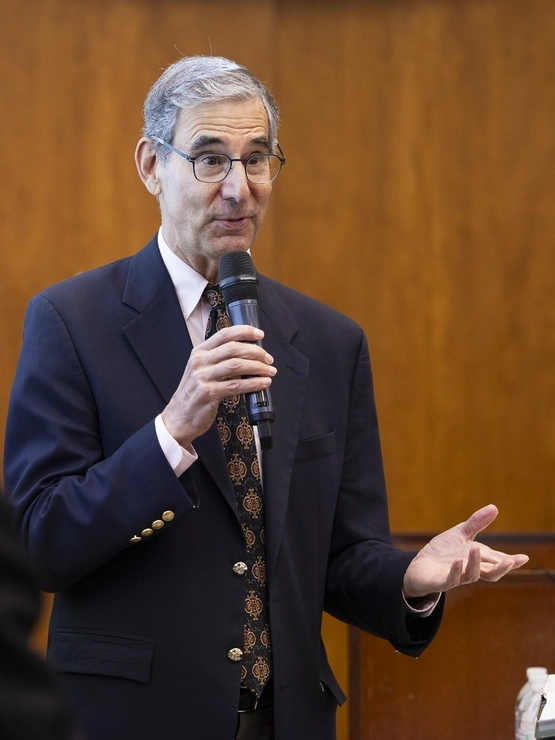
“This was an amazing day of learning, sharing, showcasing, and networking,” reflected Michael Golden, GRD’07, vice dean of innovative programs and partnerships. “The buzz and excitement was palpable—with ebullient engagement and outstanding content. By bringing together entrepreneurs developing proven solutions, leaders and educators seeking them, and the organizations that can help implement them for impact, we’re building the kind of collaborative relationships that move education reform forward.”
As Penn GSE continues to evolve as a hub for education entrepreneurship, the Catalyst Innovation Summit stands out as a model for how a university can help launch not only new products—but new opportunities. As Golden put it: “It’s always thrilling when Catalyst @ Penn GSE can be right at the center of it all.”
Media Inquiries
Penn GSE Communications is here to help reporters connect with the education experts they need.
